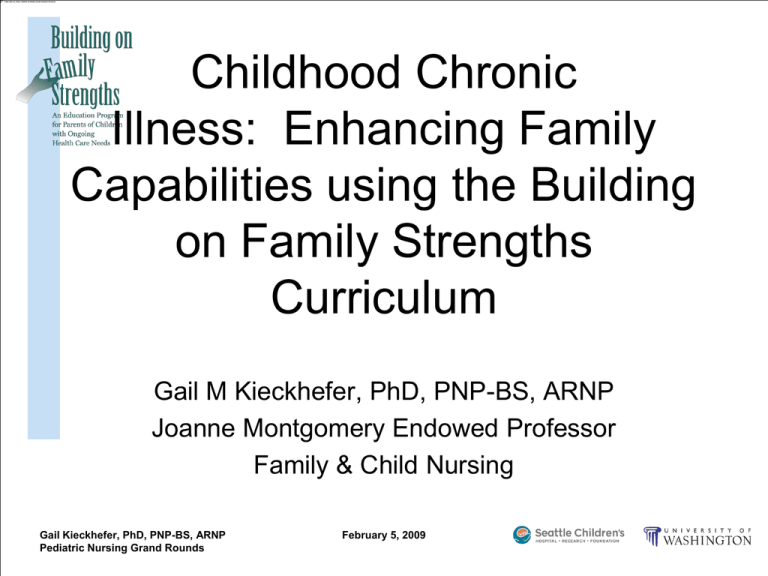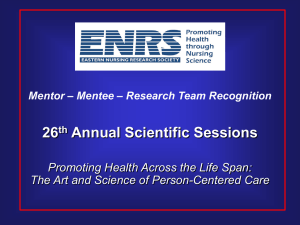Childhood Chronic Illness: Enhancing Family
advertisement

Childhood Chronic Illness: Enhancing Family Capabilities using the Building on Family Strengths Curriculum Gail M Kieckhefer, PhD, PNP-BS, ARNP Joanne Montgomery Endowed Professor Family & Child Nursing Gail Kieckhefer, PhD, PNP-BS, ARNP Pediatric Nursing Grand Rounds February 5, 2009 • Purpose of grant (HS013384) • Need – Program – Parent and interdisciplinary team • Design of the curriculum – Content – Processes • Evaluation plan and results • Implications for nursing – Practice – Future research Gail Kieckhefer, PhD, PNP-BS, ARNP Pediatric Nursing Grand Rounds February 5, 2009 Purpose of Grant • • • • Design & test outcomes Parent education & support curriculum Randomized clinical trial Disseminate results Gail Kieckhefer, PhD, PNP-BS, ARNP Pediatric Nursing Grand Rounds February 5, 2009 Impact of Childhood Chronic illness • Health Related Outcomes – Lowered confidence in own competence – Child as vulnerable – New knowledge and skills needed • Change as condition changes • Change as child develops – Anxiety, depressive symptoms can emerge – Family quality of life can suffer Gail Kieckhefer, PhD, PNP-BS, ARNP Pediatric Nursing Grand Rounds February 5, 2009 Need for Parent and Interdisciplinary Team Co-Investigators Key Personnel Nanci Villareale, nursing Lyn Kratz, social work Elizabeth Bennett, health education Virginia Sharp, statistical analysis Nancy Uding, parent Cristine Trahms, nutrition Shervin Churchill, statistical analysis Megan Sety, public health & social work Gail Kieckhefer, PhD, PNP-BS, ARNP Pediatric Nursing Grand Rounds February 5, 2009 Approaches to Enhance Health Related Outcomes • Knowledge & Skills – Beliefs and behavior change – Practice • Support – Other parents – Experienced providers Gail Kieckhefer, PhD, PNP-BS, ARNP Pediatric Nursing Grand Rounds February 5, 2009 Design of the Curriculum Content • Impact of Living with a Childhood Chronic Illness: An Overview – Key issues & challenges – Managing family life & stress • Practical skills • Muscle relaxation – Introducing the concepts of self-efficacy and parent-child shared management – Making an effective action plan Gail Kieckhefer, PhD, PNP-BS, ARNP Pediatric Nursing Grand Rounds February 5, 2009 Design of the Curriculum Content • Emotional Dimensions of parenting a child with chronic illness – Exploring feelings – Managing hard feelings – Self-talk Gail Kieckhefer, PhD, PNP-BS, ARNP Pediatric Nursing Grand Rounds February 5, 2009 Design of the Curriculum Content • Impact on the Child – Parent Leadership Model – Child directed interactions and play – Depression in children – Tricks for helping one’s child manage pain and stress Gail Kieckhefer, PhD, PNP-BS, ARNP Pediatric Nursing Grand Rounds February 5, 2009 Design of the Curriculum Content • Impact on Relationships and Family Communication – Strained relationships and communications – Self-massage – Effective communication and listening skills Gail Kieckhefer, PhD, PNP-BS, ARNP Pediatric Nursing Grand Rounds February 5, 2009 Design of the Curriculum Content • Impact on your Parenting – Promoting child capabilities through developmentally appropriate sharedmanagement – Three styles of communication including assertive communication – Using distraction Gail Kieckhefer, PhD, PNP-BS, ARNP Pediatric Nursing Grand Rounds February 5, 2009 Design of the Curriculum Content • Working with Large Systems and Finding Resources – Healthcare and education • navigating systems • things you can do & things you want to teach your child to do – Skills for effective partnering & shared decisionmaking within the family & medical home • listening; observing; positive communication • advocacy • conflict management Gail Kieckhefer, PhD, PNP-BS, ARNP Pediatric Nursing Grand Rounds February 5, 2009 Design of the Curriculum Content • Transitions and Finding Meaning and Facing the Future – Transition Timeline – The Family Plan – Finding meaning in your experience – Transitioning out of the class Gail Kieckhefer, PhD, PNP-BS, ARNP Pediatric Nursing Grand Rounds February 5, 2009 Design of the Curriculum Processes • • • • • • 7 Weekly, 2 hr sessions Brief presentations by co-facilitators Structured parent discussions Modeling Action plans Scripted facilitator manual & parent manual Gail Kieckhefer, PhD, PNP-BS, ARNP Pediatric Nursing Grand Rounds February 5, 2009 Evaluation Plan and Results • Curriculum design – Individual parents,focus groups & pilot • Curriculum impact – Randomized clinical trial – Baseline, 6 and 12 month follow-up • Apriori model • Parent outcomes Gail Kieckhefer, PhD, PNP-BS, ARNP Pediatric Nursing Grand Rounds February 5, 2009 Greater parent-child shared management Parent Education Greater parental self-efficacy Increased parent coping Better emotional health Parent and child demographic and condition characteristics Gail Kieckhefer, PhD, PNP-BS, ARNP Pediatric Nursing Grand Rounds Greater family quality of life February 5, 2009 Not screened N=27 (Not interested after hearing initial description; not reachable after their initial contact) Total initial contacts from potential participants N=233 Excluded N=78 (Did not meet eligibility criteria; class times didn’t work; couldn’t commit to 7 sessions; didn’t return baseline survey; withdrew before randomization) Assessed for eligibility N=207 Randomized N=129 Withdrew before classes began and did not provide any follow-up N=1 Treatment at Baseline N=83 Control at Baseline N=46 Data not included in analysis1 N=5 Did not return 6 month survey N=7 Did not return 6 month survey N=2 Data not included in analysis1 N=14 Final Treatment Analyzed Final Control Analyzed N=61 N=39 Gail Kieckhefer, PhD, PNP-BS, ARNP Pediatric Nursing Grand Rounds February 5, 2009 Sample Parents 92% female 73% married 82% > 12 grade 90% non-Hispanic Gail Kieckhefer, PhD, PNP-BS, ARNP Pediatric Nursing Grand Rounds February 5, 2009 Sample • Child Characteristics – 43% female – 84% mod to severe severity – 62% impacts child’s ability usually or always Gail Kieckhefer, PhD, PNP-BS, ARNP Pediatric Nursing Grand Rounds February 5, 2009 Baseline BFS Baseline Self Efficacy Scores (n=123) 50% 44% 40% 39% 30% 20% 10% 13% 0% 4% 0% 0 2 3 4 → More Self Efficacy → Gail Kieckhefer, PhD, PNP-BS, ARNP Pediatric Nursing Grand Rounds February 5, 2009 5 Baseline BFS Baseline Shared Management Scores (n=127) 40% 35% 30% 25% 20% 15% 10% 5% 0% 34% 34% 15% 9% 8% 1 2 3 4 → More Shared Management → Gail Kieckhefer, PhD, PNP-BS, ARNP Pediatric Nursing Grand Rounds February 5, 2009 5 Baseline BFS F-COPES Score at Baseline (n=128) 30% 27% 25% 25% 20% 20% 13% 15% 9% 10% 5% 4% 2% 0% 60-69 70-79 80-89 90-99 100-109 → Better Coping → Gail Kieckhefer, PhD, PNP-BS, ARNP Pediatric Nursing Grand Rounds February 5, 2009 110-119 120-130 Baseline Baseline Distribution of Depression Scores (CESD-10), n=129 12 10 <10 10-14 8 15-30 6 4 2 0 0 1 2 3 4 5 6 7 8 9 10 11 12 13 14 15 16 17 18 19 20 21 22 23 24 25 26 27 Gail Kieckhefer, PhD, PNP-BS, ARNP Pediatric Nursing Grand Rounds February 5, 2009 Baseline BFS Baseline Quality of Life Score 37% 40% 35% 30% 30% 25% 22% 20% 15% 11% 10% 5% 0% 20-29 30-39 40-49 → Better Quality of Life → Gail Kieckhefer, PhD, PNP-BS, ARNP Pediatric Nursing Grand Rounds February 5, 2009 50-60 6 Month Analysis • Did scores rise in intervention parents • Did scores differ between intervention and control families at 6 months Gail Kieckhefer, PhD, PNP-BS, ARNP Pediatric Nursing Grand Rounds February 5, 2009 Scale Average Score diff. after 6 months P-value 2-tailed paired ttest, within group Baseline mean score Mean score 6 months later Treatment Control Treatment Control Treatment Control Treatment Control 3.6 3.6 3.9 3.5 0.292 0.03 0.002 0.76 3.2 3.2 3.5 3.2 0.30 0.06 0.002 0.54 11.9 11.7 9.7 12.3 -2.21 0.36 0.010 0.70 96.4 96.5 103.1 95.1 6.36 -1.54 <0.001 0.34 36.1 38.9 39.5 39.6 3.19 -0.14 <0.001 0.86 Self Efficacy ↑ better (1-5) Shared Management ↑ better (1-5) CESD10 ↓ better (0-30) Cope ↑ better (29-145) Quality of Life ↑ better (15-60) Paired sample N=110, Treatment n=69, Control n=41 Gail Kieckhefer, PhD, PNP-BS, ARNP Pediatric Nursing Grand Rounds February 5, 2009 2-tailed, between Effect size for treatment groups group p-value All SELF-EFFICACY 0.049 7.7% Worst quartile 22.2% SHARED MANAGEMENT 0.097 11.1% 32.0% CESD10 0.046 18.5% 40.8% COPE 0.001 6.6% 12.1% QUALITY OF LIFE 0.010 8.6% 21.7% Gail Kieckhefer, PhD, PNP-BS, ARNP Pediatric Nursing Grand Rounds February 5, 2009 Change by 6 Month Follow-up Self Efficacy 4.0 Shared Management 4.0 3.5 3.5 3.0 3.0 2.5 2.5 2.0 2.0 1.5 1.5 1.0 1.0 Baseline Gail Kieckhefer, PhD, PNP-BS, ARNP Pediatric Nursing Grand Rounds 6 month Baseline February 5, 2009 6 month Coping Depressive Symptoms 25 130 120 20 110 15 100 10 90 80 5 70 60 0 Baseline Gail Kieckhefer, PhD, PNP-BS, ARNP Pediatric Nursing Grand Rounds Baseline 6 month February 5, 2009 6 month Quality of Life 60 50 40 30 20 10 Baseline Gail Kieckhefer, PhD, PNP-BS, ARNP Pediatric Nursing Grand Rounds 6 month February 5, 2009 Change across 12 Month Follow-up Measure Scale Factor Coef. Std Err. P-value Self-Efficacy 1-5 Baseline 0.52 0.09 0.000 high better Time 0.04 004. Intervention 0.37 0.10 0.394 95% CI 0.33 0.07 -0.05 0.12 0.17 0.55 0.65 0.85 0.000 Shared-Management 1-5 Baseline 0.76 0.05 high better Time 0.01 0.05 Intervention 0.11 0.11 0.000 0.870 -0.09 0.11 0.17 0.56 0.60 0.84 -1.26 2.75 0.000 Coping 29-149 Baseline 0.72 0.06 high better Time 0.74 1.02 Intervention 6.90. 1.69 0.000 0.467 3.58 10.22 0.000 Depressive 0-30 Baseline 0.48 0.08 low better Time 0.60 0.55 Intervention -2.29. 0.84 Symptoms 0.000 0.281 0.32 0.64 -0.49 1.69 -3.94 -0.63. 0.000 Family Quality 15-60 Baseline 0.79 0.06 high better Time 0.43 0.51 Intervention 2.55. 0.98 Of Life 0.000 -0.58 0.406 0.009 Gail Kieckhefer, PhD, PNP-BS, ARNP Pediatric Nursing Grand Rounds February 5, 2009 0.68 0.63 0.90 1.44 4.48 Change across 12 Month Follow-up Gail Kieckhefer, PhD, PNP-BS, ARNP Pediatric Nursing Grand Rounds February 5, 2009 Gail Kieckhefer, PhD, PNP-BS, ARNP Pediatric Nursing Grand Rounds February 5, 2009 Gail Kieckhefer, PhD, PNP-BS, ARNP Pediatric Nursing Grand Rounds February 5, 2009 Gail Kieckhefer, PhD, PNP-BS, ARNP Pediatric Nursing Grand Rounds February 5, 2009 Gail Kieckhefer, PhD, PNP-BS, ARNP Pediatric Nursing Grand Rounds February 5, 2009 Limitations/considerations • • • • • Sample Only 3 time points Power Effect sizes No dose response Gail Kieckhefer, PhD, PNP-BS, ARNP Pediatric Nursing Grand Rounds February 5, 2009 Implications for Nursing Practice • Expect adult oriented programs to need extensive revision and formal evaluation • Universally offer parent education support programs • Other parents provide unique contributions • Expect absences so re-visit topics Gail Kieckhefer, PhD, PNP-BS, ARNP Pediatric Nursing Grand Rounds February 5, 2009 Implications for Nursing Research • • • • • Other modalities Other time frames Diversity Longer follow-up Do improved parent outcomes lead to child outcomes Gail Kieckhefer, PhD, PNP-BS, ARNP Pediatric Nursing Grand Rounds February 5, 2009 Comments and Questions Gail Kieckhefer, PhD, PNP-BS, ARNP Pediatric Nursing Grand Rounds February 5, 2009





